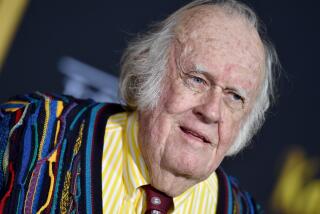PASSINGS: Johnny Seven, Victor Cianca, Mimi Perloff, Donald N. Gates
Johnny Seven
Prolific character actor
Johnny Seven, 83, a prolific character actor who appeared in dozens of TV episodes that included a recurring role as Lt. Carl Reese on “Ironside,” died Friday at Providence Holy Cross Medical Center in Mission Hills, said his son, John A. Fetto. He had lung cancer.
In a five-decade career, Seven appeared in about 80 productions and had small roles in such films as “The Last Mile” (1959), “The Apartment” (1960) and “What Did You Do in the War, Daddy?” (1966). He starred in “Navajo Run,” a 1964 western that he also directed and produced.
Seven was born John Anthony Fetto II on Feb. 23, 1926, in Brooklyn, N.Y., to Italian immigrant parents who also had five daughters.
He acquired his nickname during World War II, when he was serving with the Army in the Philippines, and held onto it when he began his acting career.
“It probably sounded cool in the 1950s,” his son said Tuesday.
Seven had begun singing and acting as a teenager and performed in USO shows during the war. Back in New York, he acted in stage productions and in the early days of live television.
His many TV credits include roles on “The Phil Silvers Show,” “Mike Hammer,” “Westinghouse Desilu Playhouse,” “Rescue 8,” “The Detectives Starring Robert Taylor,” “The Untouchables,” “Naked City,” “Bonanza,” “Gunsmoke,” “Get Smart,” “Batman,” “Vega$,” “CHiPs,” “Trapper John, M.D.” and “Murder She Wrote.”
After playing Reese in the early 1970s on “Ironside,” the police drama starring Raymond Burr, he landed a recurring role on the spinoff series “Amy Prentiss.”
Seven, who had a real estate business in the San Fernando Valley, was married for 60 years to his wife, Edith. In addition to their son, they also had a daughter, Laura Pollard.
Victor Cianca
‘Candid Camera’ made cop famous
Victor Cianca, 92, a Pittsburgh police officer who rose to fame when “Candid Camera” broadcast footage of his flamboyant way of directing traffic, died Sunday in Pittsburgh, days after suffering a heart attack, said his son Richard.
In 1964, “Candid Camera” aired footage of Cianca directing traffic in Pittsburgh, using his arms and legs to keep cars moving. He often took slow, silly bows, would play an imaginary violin when a driver gave an excuse for a traffic violation and would pretend to sleep if a vehicle was driving too slowly.
Later, he had a cameo role in the movie “Flashdance.”
Mimi Perloff
Co-founder of UCLA arts group
Mimi Perloff, 95, who co-founded the UCLA arts outreach group Design for Sharing that raises money to introduce music, theater and dance to underserved groups in the community, died of natural causes Thursday at her home in Westwood, her family announced.
In 1969, Perloff and philanthropist Blanche Witherspoon joined forces to create a volunteer fund-raising organization that aimed to present arts programs to public school students, the elderly, and mentally and physically disabled people.
As of last fall, the nonprofit group had hosted more than 400,000 public school students at live arts performances staged at UCLA.
“The arts are a necessity -- not the frosting on the cake, but a basic need,” Perloff said last fall in an interview for the UCLA Live newsletter.
She was born Oct. 29, 1914, in New York and trained as a classical pianist at the Juilliard School of Music before graduating from the City University of New York’s Hunter College with a bachelor’s degree in music.
She arrived at UCLA in 1968 with her husband, Harvey S. Perloff, who was dean of the Graduate School of Architecture and Urban Planning for 15 years until his death in 1983. They had two sons, Gregg and Jeffrey.
Besides serving as Design for Sharing’s first chairwoman and on its board of directors, she was president of the board of directors of the UCLA Center on Aging and president of the UCLA Medical Center Auxiliary.
Perloff also was on the board of governors of the university’s fund-raising arm, the UCLA Foundation.
Donald N. Gates
State appellate court justice
Donald N. Gates, 83, who served as a California appellate court justice for 13 years, died of congestive heart failure Monday at his home in Atascadero, Calif., his family said.
Appointed to the 2nd District Court of Appeal in 1982, Gates ruled on a number of right-to-die cases, his family said. His highest-profile case involved Elizabeth Bouvia, a 28-year-old quadriplegic and symbol of the right-to-die movement who once sought a court’s permission to starve herself to death. In 1986, she no longer wanted to die but sought to have a painful feeding tube removed. The appellate court granted her the right to refuse force-feeding or other unwanted medical treatment.
Donald Neil Gates was born March 9, 1926, in Oregon to a family of lumberjacks and was the first in his family to attend school beyond the eighth grade. After serving in the Army Air Forces during World War II, he spent three years at UC Berkeley and earned his law degree at UC Hastings College of Law in 1953.
He practiced law in the San Fernando Valley and became a staff attorney in 1963 for the 2nd District Court of Appeal. A decade later, Gates was named the court’s chief research attorney, a position he held until 1982.
Twice divorced, he married his third wife, Tonya, 30 years ago, and ran marathons and raced dirt bikes into his 70s.
-- times staff and wire reports
More to Read
Start your day right
Sign up for Essential California for the L.A. Times biggest news, features and recommendations in your inbox six days a week.
You may occasionally receive promotional content from the Los Angeles Times.






